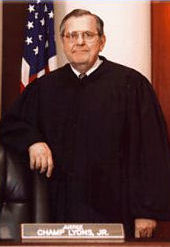Champ Lyons
| Champ Lyons, Jr. | |
|---|---|
| 1940 | |
| Alabama Supreme Court Justice | |
| Assumed office 1998 | |
| Succeeded by | James Allen Main |
| Political party | Republican |
Champ Lyons, Jr. was a judge on the Supreme Court of Alabama. He served from 1998 until January 14, 2011, when he suddenly resigned.[1]
Education
Lyons graduated from Harvard University in 1962, majoring in American Government, and earned his J.D. from The University of Alabama School of Law in 1965. In law school, he served as Editor-in Chief of the Alabama Law Review, and he was elected to membership in Omicron Delta Kappa and Bench and Bar Legal Honor Society.
Professional career
Upon graduation from law school, Lyons served for two years as law clerk to the Honorable Daniel H. Thomas of the United States District Court for the Southern District of Alabama. After his federal court clerkship, he worked in the Montgomery firm of Capell, Howard, Knabe and Cobbs.
Lyons then moved to Mobile in 1976 where he commenced practice with Helmsing, Lyons, Sims & Leach, specializing in complex civil litigation at the trial and appellate levels. In January 1998, he became Legal Advisor to Governor James. Before leaving private practice, he participated in over 60 appeals to state and federal courts. He argued cases before the Alabama Supreme Court, cases before Fifth Circuit and Eleventh Circuit of the United States Courts of Appeals.
Awards and associations
Associations
- Member of the Order of Samaritan, University of Alabama School of Law
- Elected Member, American Law Institute
- Elected Fellow, American Bar Mobile Bar Association
- Past President, Harvard Alumni Association
Awards
- Sam W. Pipes Distinguished Alumnus Award, the University of Alabama school of Law
- Judge Walter P. Gewin Award, Alabama State Bar[2]
For a complete summary of Judge Champ Lyons, Jr.'s campaign contributions, visit Follow the Money: Champ Lyons, Jr.
2006 election
Lyons was re-elected to the court in 2006.[3][4]
| Candidate | Incumbent | Seat | Party | Primary % | Election % | |
|---|---|---|---|---|---|---|
| Champ Lyons |
Yes | Place 1 | Republican | 220,886 | ||
| Ben Hand | No | Place 1 | Republican | 145,105 |
Noteworthy cases
Denial of minor's abortion
The Alabama Supreme Court has upheld the July 20 decision of a lower court judge who refused to allow a pregnant teenager to obtain an abortion without parental consent. Under requirements handed down by the U.S. Supreme Court, protective laws which establish that parents be notified when a minor daughter is contemplating an abortion must have a " judicial bypass"--the minor must go to a court to establish either that the abortion is in her "best interest" or that she is "mature" enough to make the decision on her own. Ordinarily, such requests are rubber stamped, but the trial judge who denied the waiver for the 17-year-old girl wrote that the "'testimony of the minor and her godmother appeared to be rehearsed and that neither of the two individuals showed any emotion concerning the very serious request that they were making in this proceeding.... This court did not believe the minor or her godmother,' who is identified as a woman with children."
Chief Justice Roy Moore and Justices Harold Frend See, Jr., Champ Lyons, Jr., Jean Brown, and Lyn Stuart agreed. The majority said the lower court's conclusions, "although subjective, were based on its having personally viewed the witnesses as they testified and cannot be questioned on appeal, where we have before us only a cold, printed record." The dissenting justices attributed the decision to "religious opposition" that is "pervasive and intransigent" in Alabama.[5]
Child custody denied to lesbian couple
In 1998, Judge Lyons authored an opinion removing a child from her mother’s custody because the mother was in a committed and open lesbian relationship. According to court documents, "The father sought custody of the child only after he had remarried and had discovered that the mother and [her girlfriend] were not conducting a discreet affair in the guise of “roommates” but were, instead, presenting themselves openly to the child as affectionate “life partners” with a relationship similar to that of the father and the stepmother. This is, therefore, not a custody case based solely upon the mother’s sexual conduct, where the “substantial detrimental effect” element might be applicable. Rather, it is a custody case based upon two distinct changes in the circumstances of the parties: (1) the change in the father’s life, from single parenthood to marriage and the creation of a two-parent, heterosexual home environment, and (2) the change in the mother’s homosexual relationship, from a discreet affair to the creation of an openly homosexual home environment."[6]
See also
External links
- Lyons's Biography
- Alabama Judicial System
- Vote Smart
- Colorado Firm That Did Securities Filing Isn't Subject to Alabama Court's Jurisdiction
- Follow the Money: Champ Lyons, Jr. 2006
- Lyon's favorite Founding Father
- Project Vote Smart
Footnotes
- ↑ WRCBtv.com, "Ala. Justice Champ Lyons resigns," January 14, 2011
- ↑ Alabama Supreme Court, Champ Lyons
- ↑ Alabama Secretary of State, 2006 General Election Results
- ↑ Alabama Secretary of State, 2006 Primary Election Results
- ↑ National Right to Life "Alabama High Court Upholds Judge Who Denied Abortion to Teen
- ↑ Word Press





